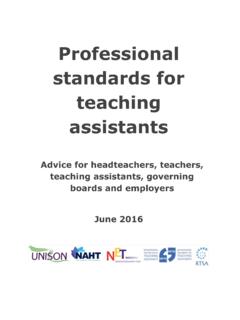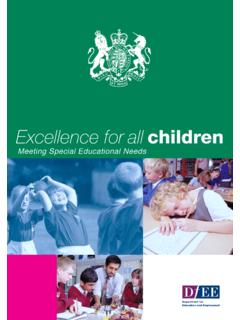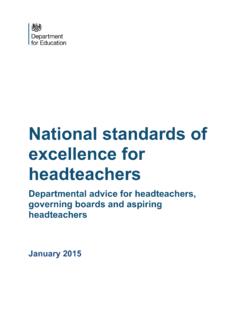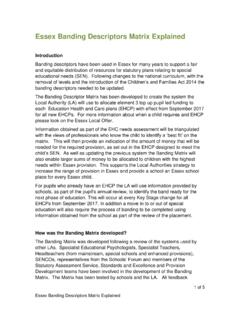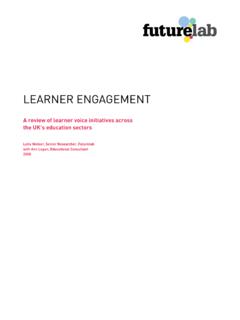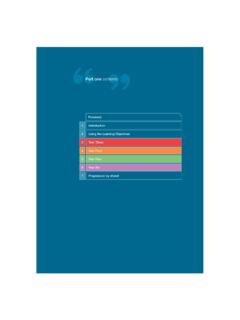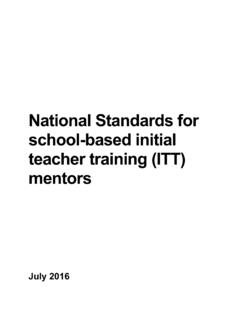Transcription of National Advisory Committee on Creative and Cultural …
1 National Advisory Committee onCreative and Cultural EducationAll Our Futures:Creativity, Culture and EducationReport tothe Secretary of State for Education and Employmentthe Secretary of State for Culture, Media and SportMay 1999 ContentsContentsNACCCE report1 Terms of Reference2 Membership of the Committee3 Introduction and Summary5 Part One: Facing the Challenge for Education283. Cultural the Challenge61 Part Two: A New Balance5. Developing the and Standards124 Part Three: Beyond the Partnerships1389. Funding and People174 Part Four: A National StrategyLooking Ahead190 Detailed of , Notes and and Consultations229 Terms of ReferenceTerms of ReferenceNACCCE report2 The National Advisory Committee on Creative and Cultural Education was establishedin February 1998 by the Secretary of State for Education and Employment, the David Blunkett MP and the Secretary of State for Culture, Media and Sport, theRt.
2 Hon Chris Smith MP. Our terms of reference are:To make recommendations to the Secretaries of State on the Creative andcultural development of young people through formal and informaleducation: to take stock of current provision and to make proposals forprinciples, policies and report makes recommendations for provision in formal and informal education foryoung people to the age of 16: that is, to the end of compulsory education. Ourinquiry coincides with the Government s planned review of the National report includes specific recommendations on the National Curriculum. It alsoincludes recommendations for a wider National strategy for Creative and culturaleducation. Membership of the CommitteeMembership of the CommitteeNACCCE report3 Professor Ken Robinson (Chairman), University of WarwickProfessor Lewis Minkin (Vice-chair), Sheffield Hallam UniversityProfessor Eric Bolton CB, Formerly Senior Chief InspectorDawn French, Actor/ComedianLindsey Fryer, Vice-chair, Engage The National Association of Gallery EducationProfessor Susan Greenfield, University of OxfordValerie Hannon, Chief Education Officer, DerbyshireLenny Henry CBE, Actor/ComedianDawn Holgate, Director of Education, Phoenix Dance CompanyDame Tamsyn Imison, Head, Hampstead School, LondonClive Jones, Chief Executive, Carlton TelevisionJudith Kelly OBE, Artistic Director, West Yorkshire PlayhouseProfessor Sir Harold Kroto Kt.
3 , FRS, University of SussexSir Claus Moser KCB, CBE, FBA, Chairman, Basic Skills AgencySir Simon Rattle Kt., CBE, ConductorLord Stone of Blackheath, Managing Director, Marks & Spencer plcProfessor Helen Storey, Fashion DesignerCarol Traynor, Head, St Boniface RC Primary School, SalfordResearch OfficerMathilda JoubertAdministrative OfficerLynn GreenMembership of the CommitteeNACCCE report4 ObserversJohn Connolly, DfEE (from August 1998)Julian Critchley, DfEEJanet Dawson, DfEETheresa Downing, DfEE (to August 1998)Tony Dyer, DCMS (from December 1998)Patrick Fallon, DCMS (to November 1998)David Fawcett, DCMS (to November 1998)Allan Ferries, DCMS (from December 1998)Peter Jones HMI, OFSTEDTony Knight, QCAA ngela Walsh, TTAI ntroduction and SummaryIntroduction and SummaryNACCCE report5 The Purpose of this 1997, the Government published its White Paper Excellencein Schools.
4 It described education as a vital investment in human capital for the twenty-first century. It argued that oneof the problems in education is the low expectations of youngpeople s abilities and that it is essential to raise morale,motivation and self esteem in schools. The main focus of theWhite Paper was on raising standards in literacy and this will not be enough to meet the challenges that faceeducation, and the White Paper recognised this. It also said:Our aim must be to create a nationwhere the Creative talents of all thepeople are used to build a trueenterprise economy for the twenty-first century where we compete onbrains, not Prime Minister, the Rt. HonTony Blair MPIf we are to prepare successfully for the twenty-firstcentury we will have to do more than just improveliteracy and numeracy skills.
5 We need a broad,flexible and motivating education that recognisesthe different talents of all children and deliversexcellence for emphasised the urgent need to unlock the potential of everyyoung person and argued that Britain s economic prosperityand social cohesion depend on cannot rely on a small lite, nomatter how highly educated or highlypaid. Instead we need the creativity,enterprise and scholarship of all Hon David Blunkett MP,Secretary of State for Education report argues that a National strategy for Creative andcultural education is essential to that process. We put the casefor developing Creative and Cultural education; we considerwhat is involved; we look at current provision and assess theopportunities and obstacles; and we set out a National Creative education we mean forms of education thatdevelop young people s capacities for original ideas and action:by Cultural education we mean forms of education that enablethem to engage positively with the growing complexity anddiversity of social values and ways of life.
6 We argue that thereare important relationships between Creative and culturaleducation, and significant implications for methods of teachingand assessment, the balance of the school curriculum and forpartnerships between schools and the wider must change the concept ofcreativity from being something thatis added on to education, skills,training and management and makesure it becomes intrinsic to all Hon Chris Smith MP, Secretaryof State for Culture, Media andSportWhat is this Report About? report develops five main themes:The Challenge for EducationEducation faces challenges that are without these challenges calls for new priorities in education,Introduction and SummaryNACCCE report6including a much stronger emphasis on Creative and culturaleducation and a new balance in teaching and in the PotentialCreativity is possible in all areas of human activity, includingthe arts, sciences, at work at play and in all other areas ofdaily life.
7 All people have Creative abilities and we all havethem differently. When individuals find their creativestrengths, it can have an enormous impact on self-esteem andon overall and ControlCreativity is not simply a matter of letting go. Seriouscreative achievement relies on knowledge, control of materialsand command of ideas. Creative education involves a balancebetween teaching knowledge and skills, and encouraginginnovation. In these ways, Creative development is directlyrelated to Cultural UnderstandingYoung people are living in times of rapid Cultural change andof increasing Cultural diversity. Education must enable themto understand and respect different Cultural values andtraditions and the processes of Cultural change anddevelopment.
8 The engine of Cultural change is the humancapacity for Creative thought and Systemic ApproachCreative and Cultural education are not subjects in thecurriculum, they are general functions of them effectively calls for a systemic strategy: onethat addresses the balance of the school curriculum, teachingmethods and assessment, how schools connect with otherpeople and resources and the training and development ofteachers and is this Report for? , our report is addressed to the Secretaries of State,and many of our recommendations do call for Governmentaction at various levels. But education concerns everybody:children and young people, parents, employers, those inIntroduction and SummaryNACCCE report7work, out of work or in retirement.
9 Consequently, our reportis also written for a wider audience: for parents, who want education to offer the bestopportunities for their children; for teachers and headteachers who see the potentialrange and vitality of young people s abilities; for school governors, who want their schools to bealive with energy and achievement; for other organisations who see themselves aspartners in the education of young people and whowant to find better ways of engaging with them; for business and union leaders who recognise theneed for new approaches to preparing young peoplefor the changing nature of all, our aim is to urge the need for a National strategywhich engages the energies of all of these to provide the kindof education, in substance and in style, that all young peopleneed now, and to enable them to face an uncertain anddemanding Now?
10 Are great opportunities now to promote youngpeople s Creative and Cultural education: The Government is committed to promoting thecreative abilities and Cultural understanding of allyoung people through education. At the same time,it is introducing new patterns of funding to supportextended curricula, specialist facilities andinnovation. The business community wants education to give amuch higher priority to promoting young people screative abilities; to developing teamwork, socialskills and powers of communication. Many professional and other organisations are keento develop innovative partnerships with education,through visits, residencies and liaison schemes. New technologies are providing unprecedentedaccess to ideas, information, people andIntroduction and SummaryNACCCE report8organisations throughout the world, as well as tonew modes of creativity, personal expression, Cultural exchange and opportunities are considerable: and so are the of creativity and of Cultural development concern thewhole of education.
